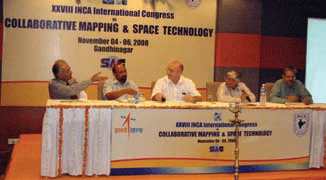Articles in the Articles Category

The competition started nearly two decades ago in the United States as the National Engineers Week Future City Competition with the aim to provide fun and exciting educational engineering programs for school students by combining stimulating engineering challenges with ‘hand-on’ application to enable them to present their vision of a city of the future…

Demand for Satellite Navigation technology and applications keeps on increasing in a wide range of economical, social, technological and environmental sectors. This growing interest in the development of Satellite Navigation Systems is demonstrated by the interest of several countries in starting the development of new systems or contributing to existing ones. The major rational behind is…
December 2008
GEOExpo 2008 China
2 – 4 December 2008,
Shanghai, China
sales@chinageo-expo.com
http://www.ChinaGeo-Expo.com
January 2009
ESRI Asia Pacific User Conference
20-21 January 2009
Singapore city,Singapore
http://www.esri.com/events/apuc/index.html
Intergeo East
27-29 January 2009
Istanbul,Turkey
http://www.intergeo-east.com
February 2009
Trimble Dimension 2009
123-25, February 2009
The Mirage, Las Vegas, USA
http://www.trimbleevents.com/dimensions09
March 2009
Munich Satellite Navigation Summit Conference
March 3-5,2009
Munich, Germany
http://www.munich-satellite-navigation-summit.org
April 2009
GEO Siberia 2009
21-23 April
Novosibirsk, Russian
nenash@sibfair.ru
http://www.geosiberia.sibfair.ru
May 2009
International Conference on …
India witnesses another onslaught of brutality, helplessly.
A country of more than a billion, the world’s largest democracy, the rising Asian space power, nuclear power… was held to ransom.
For more than 60 hours.
By a small, but heavily armed, well-trained and highly motivated group.
An execution of meticulous planning, using advanced technologies like digital maps, satellite …
The three days of INTERGEO, which was held at the Bremen Exhibition Centre this year, have confirmed that the world’s largest congress trade fair for geodesy, geoinformation and land management has a special place in the industry.
“INTERGEO is a very important event to show our latest developments and is …

As geospatial technology becomes an integral part of our daily lives, our ‘worldview’ grows and the world becomes a ‘smaller’ place. The technology itself has many facets, managed and used by a growing number of people. To understand how the interactions are taking shape among the various players of geospatial technology, …
December 2008
GEOExpo 2008 China
2 – 4 December 2008,
Shanghai, China
sales@chinageo-expo.com
http://www.ChinaGeo-Expo.com
January 2009
ESRI Asia Pacific User Conference
20-21 January 2009
Singapore city,Singapore
http://www.esri.com/events/apuc/index.html
Intergeo East
27-29 January 2009
Istanbul,Turkey
http://www.intergeo-east.com
February 2009
Trimble Dimension 2009
123-25, February 2009
The Mirage, Las Vegas, USA
http://www.trimbleevents.com/dimensions09
March 2009
Munich Satellite Navigation Summit Conference
March 3-5,2009
Munich, Germany
http://www.munich-satellite-navigation-summit.org
April 2009
GEO Siberia 2009
21-23 April
Novosibirsk, Russian
nenash@sibfair.ru
http://www.geosiberia.sibfair.ru
May 2009
International Conference on …
The Terrain Mapping camera (TMC) on board Chandrayaan-1 spacecraft was successfully operated on October 29, 2008 through a series of commands issued from the Spacecraft Control Centre of ISRO Telemetry, Tracking and Command Network (ISTRAC) at Bangalore. Analysis of the first imagery received by the Indian Deep Space Network (IDSN) at Byalalu and later processed…












 (5.00 out of 5)
(5.00 out of 5)